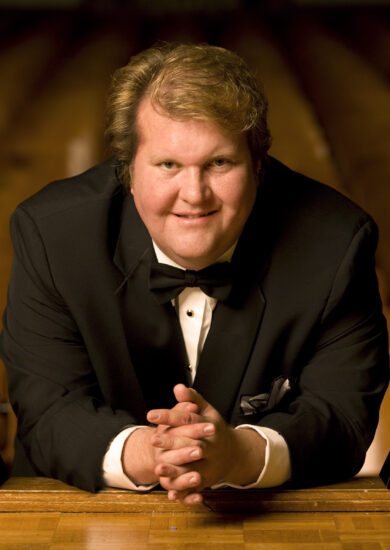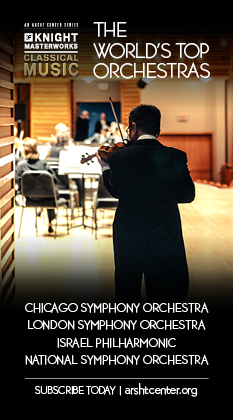Griffey and Jones bring sterling advocacy to English and American song

Tenor Anthony Dean Griffey performed a recital of English and American art song Friday night at Gusman Concert Hall.
When singers perform art song recitals, German and French repertoire tend to dominate programming. On Friday night, tenor Anthony Dean Griffey and pianist Warren Jones made a refreshing departure to that pattern by presenting a concert of songs by American and British composers at UM Gusman Concert Hall in Coral Gables, presented by Frost Music Live.
A concert and opera veteran, Griffey has sung on major stages from the Met to the Paris Opera and currently is a faculty member at the Eastman School of Music. Jones has long been known as a top vocal accompanist. Both artists fully lived up to their reputations.
A lyric tenor with a baritonal lower range and a powerful top, Griffey boasts a smooth, warmly burnished timbre. His textual projection is nuanced and expressive.
Griffey opened with Three Songs for voice, viola and piano by Frank Bridge (1879-1941). Best known as Benjamin Britten’s teacher and mentor, Bridge created a considerable output of vocal, chamber and orchestral scores. While his late works veer into atonality, Bridge’s early song settings owe more to Faurè and Gallic influences.
“Far, far from each other” is accompanied by an almost impressionistic keyboard part which was perfectly placed by Jones. Griffey’s firm, pliant instrument subtly infused the haunting melody of “Music, when soft voices die” with depth and poignancy. Violist and Frost faculty member Jodi Levitz provided a glowing halo of vibrancy around the vocal line, and Jones’ pianism was a veritable master class in accompaniment.
Juliana Hall is an American composer who wrote her setting of Walt Whitman’s poem The Mystic Trumpeter for Griffey in 2021. Hall’s imaginative, seven part cycle abounds in surprising effects. The opening lines of “Hark! Some wild trumpeter” require the singer to proclaim like a trumpet which Griffey carried off with striking skill. Wild, agitated piano figures abound in “Blow again trumpeter-conjure war’s wild alarums.” The role of Britten’s Peter Grimes was Griffey’s operatic calling card and Hall’s jarring musical portrait of war found the tenor on similar terrain, both charismatic and frightening.
His sound could turn soft and dreamy for “Blow again trumpeter! And fore thy theme, Love.” In the concluding “Now trumpeter, sing to my soul,” Hall almost matches the eloquence of Whitman’s words in a portrait of hope for a better world. With his timbre nearly that of a heldentenor, Griffey’s lustrous rendition was well matched to Hall’s varied palette which ranges from lyrical to more astringent writing.
Ralph Vaughan Williams’ On Wenlock Edge was written in 1909. Scored for tenor, piano and string quartet, it is based on edited versions of six poems from A.E. Houseman’s collection “A Shropshire Lad.” The opening title song with its restless keyboard underpinning suggests the turmoil and drama of Britten more than the pastoral and folk-infused Vaughan Williams.
Vaughan Williams’ more typically songful aura quickly returns for “From Far, From Eve and Morning” and “Oh, When I Was in Love with You.” This cycle played to Griffey’s strengths as a vocal actor. For “Is My Team Ploughing?” he sang in two distinct voices, representing two characters. One – a dead man – emerged dulcet while his friend, who answers his questions uniformly in the negative, resounded in a harsh and rugged manner.
“Brendon Hill,” the longest song of the group, opens wistfully in happy memories before turning dark and tragic as the protagonist invokes the death of his beloved. Griffey skillfully encompassed the stark mood shifts. His final pianissimo iteration of the words joining his beloved in death capped a mini-theatrical soliloquy. Throughout Griffey’s shaded dynamics and Jones’ beautifully calibrated pianism was matched by the balanced and incisive articulation of the student quartet, coached by Jeffrey Zeigler.
Two songs by Ned Rorem (1923-2022) concluded the program on a felicitous note. The wit of “I am Ros” and the melodic tones of “Early in the Morning” were given intimate treatment by Griffey.
Standing ovations and cheers from an audience populated by many Frost vocal students who had taken part in Griffey and Jones’ masterclasses, brought an encore of the Shaker melody “The Gift to Be Simple” (in Aaron Copland’s arrangement from his OId American Songs), sung in straightforward fashion with the easy style of a refined salon performer.
Frost Music Live presents Sandbox Percussion playing Andy Akiho’s Seven Pillars 7:30 p.m. September 27 at UM Newman Recital Hall in Coral Gables. music.miami.edu
Posted in Performances
Leave a Comment
Mon Sep 11, 2023
at 12:28 pm
No Comments



